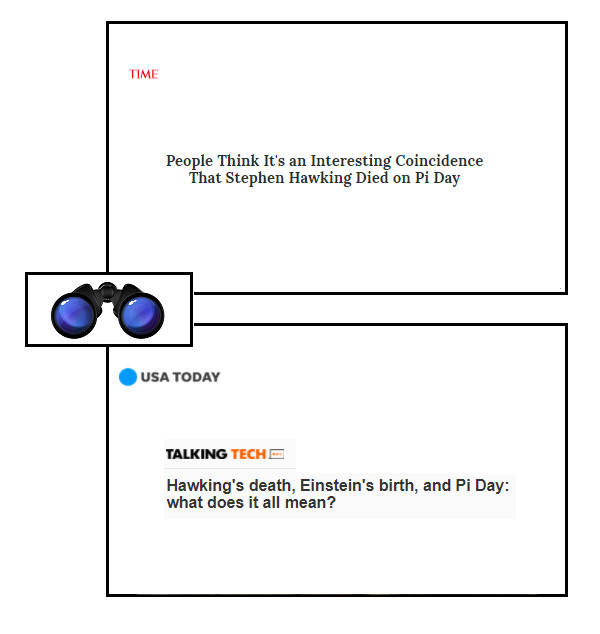Time In all his tuneful turning (i)
[ by Charles Cameron — Stephen Hawking, RIP, and synchronicity? ]
.
Connsider these high-popularity responses to Stephen Hawking‘s death:
Sources:
USA Today, Hawking’s death, Einstein’s birth, and Pi Day: what does it all mean? Time, People Think It’s an Interesting Coincidence That Stephen Hawking Died on Pi Day
**”
The Time article focused on the internet:
Some people on the internet think Stephen Hawking couldn’t have calculated a better day to die.
Calculated. Like it.
The 76-year-old theoretical physicist, one of science’s most famous luminaries died on March 14, also known as National Pi Day — an annual day for scientists and mathematicians around the world to celebrate the value of pi that even includes deals on pizzas and actual pies. Suffice it to say that the noteworthy coincidence was not lost on the internet.
The date of Hawking’s death — 3/14 — is significant because 3.14 are the first three digits of pi, a bedrock of geometry. Specifically, it’s the ratio of a circle’s circumference to its diameter. Naturally, the fact that science’s big celebration overlapped with the day the life of the party left us is making people geek out about the details.
As soon as news spread that Hawking died early Wednesday morning in London, people were quick to connect the dots.
Connect the dots, eh?
**
And here’s the complete USA Today article:
So, is there some mystical theory explaining how noted astrophysicist Stephen Hawking died on the same day Albert Einstein was born, which also happens to be the day we honor the mathematical constant Pi?
Nope. It’s just all one giant coincidence.
Hawking died at 76, his family confirmed early Wednesday. He was considered one of the world’s foremost theoretical physicists, developing critical theories on black holes and writing A Brief History of Time to explain complex scientific concepts to the masses.
That’s it. Nope, in a word. Nope. There is no “mystical theory explaining how noted astrophysicist Stephen Hawking died on the same day Albert Einstein was born, which also happens to be the day we honor the mathematical constant Pi”.
That’s decided without consulting Pythagoras, Newton, Johann Valentin Andreae, Hermann Hesse‘s Joseph Knecht, or any of a dozen other worthies I might name..
**
But note: Warren Leight adds another datapoint and brings the circuit to completion:
Stephen Hawking was born January 8, 1942, on the 300th anniversary of Galileo's death. He died today, March 14th, on the anniversary of Einstein's birth. Time is circular – no beginning, no end.
— Warren Leight (@warrenleightTV) March 14, 2018
Galileo, ooh.
It seems worth recalling at this point that pi is an irrational number.
**
Where do we go from here?
First, note that Warren Leight posts that Hawking died on the 14th, in a tweet dated the 13th.
One of Leight’s commenters challenges the whole coincidence chain:
He died March 13th
Leight’s response to that challenge could also serve as a response to mine:
It depends on how and where you measure time
Time is circular, date is relative..
**
God save us, here’s a game ref:
– Stephen Hawking dies
– World Pi Day ?
– Albert Einstein's birthday
Playing poker on Star Trek: pic.twitter.com/tSBz25e6CJ— Chris Armstrong (@DameYankee) March 14, 2018
Is that Johann Sebastian Bach?
Kidding.
**
May the extraordinarily, ceaselessly curious mind of Stephen Hawking rest at last in the balm of peace.
**
And my title, Time in all its tuneful turning?
It’s from Dylan Thomas, approximately. He wrote, in this masterpiece, Fern Hill:
And nothing I cared, at my sky blue trades, that time allows
In all his tuneful turning so few and such morning songs
Before the children green and golden
Follow him out of grace…
I want to suggest that Dylan Thomas is at least as great a thinker about time as Stephen Hawking, and Fern Hill is my proof text to that effect. I’ll explain why in part ii of this post.




March 17th, 2018 at 3:51 pm
And this:
From A Physicist’s Farewell to Stephen Hawking